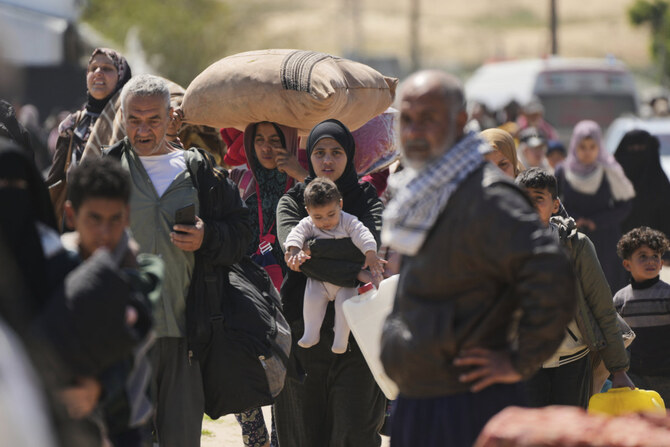DEIR AL-BALAH, Gaza Strip: More than 50,000 Palestinians have now been killed in the war between Israel and Hamas in Gaza, the territory’s Health Ministry said Sunday, as new Israeli airstrikes killed at least 26 Palestinians overnight, including a Hamas political leader and several women and children.
Israel’s military also sent ground troops into part of the southern city of Rafah as thousands of Palestinians fled after new evacuation orders.
Israel ended the latest ceasefire last week with a surprise wave of strikes that killed hundreds, and it has launched ground incursions in northern Gaza. The military claimed to have “eliminated” dozens of militants in recent days.
Israel’s Cabinet late Saturday approved a proposal to set up a new directorate for advancing the “voluntary departure” of Palestinians in line with US President Donald Trump’s proposal to depopulate Gaza and rebuild it for others. Palestinians say they do not want to leave their homeland, and rights groups say the plan could amount to expulsion in violation of international law.
‘Displacement under fire’
The military ordered people to leave Rafah’s already heavily destroyed Tel Al-Sultan neighborhood on foot along a single route to Muwasi, a sprawling area of squalid tent camps. The war has forced most of Gaza’s population of over 2 million to flee within the territory, often multiple times.
“It’s displacement under fire,” said Mustafa Gaber, a journalist who left with his family. He said tank and drone fire echoed nearby.
“The shells are falling among us and the bullets are (flying) above us,” said Amal Nassar, also displaced from Rafah. “The elderly have been thrown into the streets. An old woman was telling her son, ‘Go and leave me to die.’ Where will we go?”
“Enough is enough. We are exhausted,” said a fleeing Ayda Abu Shaer, as black smoke rose in the distance.
An explosion in Gaza City hit next to a tent camp where people had been told to evacuate. “My husband is blind and started running barefoot, and my children were running,” said Nidaa Hassuna, one of the displaced.
The Palestinian Red Crescent emergency service said it lost contact with a team of medics responding to the strikes in Rafah. Spokesperson Nebal Farsakh said some were wounded.
There was no immediate comment from Israel’s military, which says it only targets militants. Israel blames civilian deaths on Hamas because it operates in densely populated areas.
Strikes kill Hamas leader, women and children
Hamas said Salah Bardawil, a well-known member of its political bureau, was killed in a strike in Muwasi that also killed his wife. Israel’s military confirmed that.
Hospitals in southern Gaza said they received a further 24 bodies from strikes overnight, including several women and children.
Gaza’s Health Ministry said 50,021 Palestinians have been killed in the war and over 113,000 have been wounded. That includes 673 people killed since Israel’s bombardment on Tuesday shattered the ceasefire.
Dr. Munir Al-Boursh, the ministry’s general director, said the dead include 15,613 children, with 872 of them under 1 year old.
The ministry does not distinguish between civilians and combatants in its count but says women and children make up over half the dead. Israel says it has killed around 20,000 fighters, without providing evidence.
Ceasefire in tatters
The ceasefire that took hold in January paused more than a year of fighting ignited by Hamas’ Oct. 7, 2023, attack into Israel, in which militants killed some 1,200 people, mostly civilians, and took 251 hostage. Most captives have been released in ceasefire agreements or other deals.
In the latest ceasefire’s first phase, 25 Israeli hostages and the bodies of eight others were released in exchange for nearly 2,000 Palestinian prisoners. Israeli forces pulled back, allowing hundreds of thousands of people to return to what remains of their homes. There was a surge in humanitarian aid until Israel cut off all supplies to Gaza earlier this month to pressure Hamas to change the ceasefire agreement.
The sides were supposed to begin negotiations in early February on the ceasefire’s next phase, in which Hamas was to release the remaining 59 hostages — 35 of them believed to be dead — in exchange for more Palestinian prisoners, a lasting ceasefire and an Israeli withdrawal. Those talks never began.
Hundreds of Israelis gathered outside Prime Minister Benjamin Netanyahu’s office in Jerusalem on Sunday to protest his handling of the war and his attempt to dismiss the head of the Shin Bet internal security service.
“I’m worried for the future of this country. And I think it has to stop. We have to change direction,” said one protester, Avital Halperin.
New settlements in the West Bank
Israel’s Cabinet passed a measure Sunday creating 13 new settlements in the occupied West Bank by rezoning existing ones, according to Bezalel Smotrich, Israel’s far-right finance minister, who is in charge of settlement construction.
This brings the number of settlements, considered illegal by the majority of the international community, to 140, said anti-settlement watchdog group Peace Now. They will now receive independent budgets from Israel and can elect their own local governments, the group said.
Iran-backed Houthis in Yemen keep up attacks
In a separate development, Iran-backed Houthi rebels in Yemen, who are allied with Hamas, launched another missile at Israel overnight. The Israeli military said it was intercepted, and there were no reports of casualties or damage.
The Houthis resumed attacks on Israel after it ended the Gaza ceasefire, portraying them as an act of solidarity with the Palestinians. Trump ordered the renewal of US strikes on the rebels last week over its previous attacks on international shipping in the Red Sea.
Most of the ships the rebels have targeted have no connection to the conflict.




























